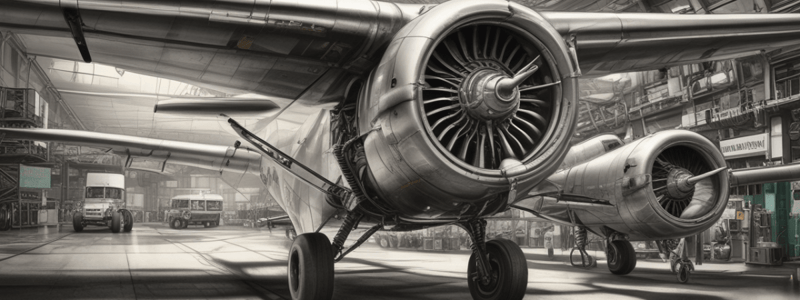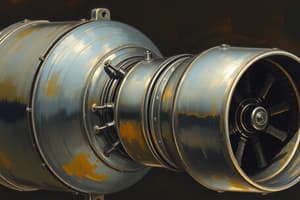Podcast
Questions and Answers
What is the primary reason for using a lubricant in an aircraft engine?
What is the primary reason for using a lubricant in an aircraft engine?
- To protect against corrosion
- To reduce friction between moving parts (correct)
- To cool the engine
- To clean the engine
What is the primary difference between aviation piston engine oils and jet engine oils?
What is the primary difference between aviation piston engine oils and jet engine oils?
- Piston engine oils are used for turbojet engines while jet engine oils are used for turboprop engines
- Piston engine oils are synthetic while jet engine oils are petroleum-based
- Piston engine oils are petroleum-based while jet engine oils are synthetic (correct)
- Piston engine oils are used for outdoor protection while jet engine oils are used for internal storage
What happens when two metal parts with peaks and valleys rub together?
What happens when two metal parts with peaks and valleys rub together?
- The metal surfaces are smoothed out
- The metal surfaces become magnetized
- The metal is worn away from the surfaces (correct)
- The metal surfaces merge together
What is the purpose of inhibitors in aviation?
What is the purpose of inhibitors in aviation?
What type of lubricants are used for turbojet, turboprop, or turbofan engines?
What type of lubricants are used for turbojet, turboprop, or turbofan engines?
How does the oil reduce friction between moving parts?
How does the oil reduce friction between moving parts?
What is the purpose of the oil cooler in an aircraft engine?
What is the purpose of the oil cooler in an aircraft engine?
What are greases composed of?
What are greases composed of?
What is the result of the metal-to-metal contact between moving parts?
What is the result of the metal-to-metal contact between moving parts?
What is the main characteristic of speciality lubricants?
What is the main characteristic of speciality lubricants?
What is the primary factor that determines the type of lubricant used in an aircraft engine?
What is the primary factor that determines the type of lubricant used in an aircraft engine?
What is the viscous nature of oil used for in an aircraft engine?
What is the viscous nature of oil used for in an aircraft engine?
What is the general rule for applying oil to bearing surfaces?
What is the general rule for applying oil to bearing surfaces?
Why did sodium soap greases tend to get washed out of the system?
Why did sodium soap greases tend to get washed out of the system?
What type of thickeners are used in high-temperature applications?
What type of thickeners are used in high-temperature applications?
What is the purpose of wiping the lubricating point clean and dry before applying oil or grease?
What is the purpose of wiping the lubricating point clean and dry before applying oil or grease?
What is an example of a modified clay thickener used in some greases?
What is an example of a modified clay thickener used in some greases?
What is the purpose of using inorganic fillers, such as molybdenum disulphide and graphite, in some greases?
What is the purpose of using inorganic fillers, such as molybdenum disulphide and graphite, in some greases?
What is a potential hazard of using an injector needle to inject grease?
What is a potential hazard of using an injector needle to inject grease?
What is a characteristic of a zerk (hydraulic) fitting?
What is a characteristic of a zerk (hydraulic) fitting?
What is the purpose of penetrants in aviation?
What is the purpose of penetrants in aviation?
What type of locations are dry lubes typically used in?
What type of locations are dry lubes typically used in?
What is a common outcome of a finger injury caused by an injector needle?
What is a common outcome of a finger injury caused by an injector needle?
How are penetrants and inhibitors typically approved?
How are penetrants and inhibitors typically approved?
What is the primary function of a grease gun?
What is the primary function of a grease gun?
Why are manual grease guns preferred for certain airframe lubrication tasks?
Why are manual grease guns preferred for certain airframe lubrication tasks?
What is the purpose of priming a new nozzle before its first use?
What is the purpose of priming a new nozzle before its first use?
What is the typical pressure range of a manual grease gun?
What is the typical pressure range of a manual grease gun?
What is the purpose of dedicating a grease gun to a single type of grease?
What is the purpose of dedicating a grease gun to a single type of grease?
What is the consequence of over greasing bearings?
What is the consequence of over greasing bearings?
Flashcards are hidden until you start studying
Study Notes
Aero Engine Oils
- Piston engine oils are typically mineral petroleum oils, either straight mineral or blended with additives, including part synthetic multi-grade oils.
- Jet engine oils for turbojet, turboprop, and turbofan engines can be mineral-based or synthetic, with an emphasis on synthetic for modern engines.
Greases
- Greases are formulated with mineral or synthetic base oils combined with metal soaps or organic thickeners, providing versatility in lubrication.
Inhibitors
- Inhibitors protect parts from corrosion and can be oils, solvent compositions, pastes, or additives, effective for outdoor conditions and during storage.
Specialty Lubricants
- Specialty lubricants cover various products such as gear oils, instrument oils, damping fluids, anti-seize compounds, and dry lubricants, catering to specific lubrication needs.
Lubricant Properties
- Aviation lubricants are categorized into piston-engine oils and jet engine oils, each tailored to the physical and chemical requirements of respective engines.
- Aviation piston engine oils primarily use petroleum base stocks, while modern gas turbine oils are predominantly synthetic.
Functions of a Lubricant
- Reduces friction by forming a film between metal parts, allowing smoother movement and minimizing wear.
- Provides cooling by absorbing heat from engine components and circulating heated oil to cool down.
- Seals and cushions between moving parts, protecting against contaminants and ensuring optimal operation.
Oil Viscosity and Application
- Oil viscosity is crucial for maintaining a protective film, determined by the clearance between moving parts.
- Application of grease requires ensuring components are clean and dry to prevent contaminants while avoiding excessive accumulation.
Types of Greases
- Early greases were thickened with calcium soap; sodium soap greases were later introduced but were prone to water washout.
- Modern applications utilize water-resistant thickeners like barium, lithium, and aluminum compounds, and for high temperatures, non-soap thickeners or inorganic fillers like molybdenum disulfide are employed.
Safety with Lubrication Tools
- Injuries can occur with injector needles if they slip, while zerk fittings offer a safer alternative for providing grease to components.
- Grease guns are designed to inject pressurized grease into bearings, available in various types including manual and pneumatic versions.
Grease Gun Operation
- A manual grease gun delivers about 1.5 grams of grease per pump stroke, with a lever mechanism engaging a zerk fitting for efficient application.
- Each grease gun should be dedicated to a specific grease type to prevent cross-contamination and ensure proper lubrication practices, particularly to avoid over-greasing and damaging components nearby.
Studying That Suits You
Use AI to generate personalized quizzes and flashcards to suit your learning preferences.



